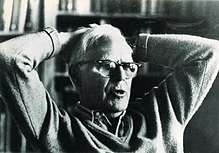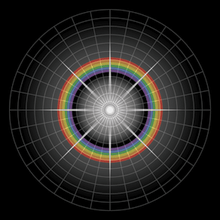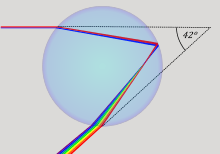
Life, viewed rationally and without illusion, appears to be a nonsense tale told by an idiot mathematician.

Mathemagical mathematics combines the beauty of mathematical structure with the entertainment value of a trick.
Martin Gardner (October 21, 1914 – May 22, 2010) was an American recreational mathematician, magician, skeptic, and author of the long-running "Mathematical Games" column in Scientific American from 1956 to 1981.
Quotes

For a moment the waves and particles dance in grotesque, inconceivably complex patterns capable of reflecting on their own absurdity.

In many cases a dull proof can be supplemented by a geometric analogue so simple and beautiful that the truth of a theorem is almost seen at a glance.

The men who radically altered history, the great scientists and mathematicians, are seldom mentioned, if at all.

I've never made a discovery myself, unless by accident.

There is still a difference between something and nothing, but it is purely geometrical and there is nothing behind the geometry.
- A surprising proportion of mathematicians are accomplished musicians. Is it because music and mathematics share patterns that are beautiful?
- The Dover Math and Science Newsletter May 16, 2011
- I can say this. I believe that the human mind, or even the mind of a cat, is more interesting in its complexity than an entire galaxy if it is devoid of life.
- Martin Gardner, puzzle master extraordinaire obituary by Colm Mulcahy, BBC News Magazine, October 21, 2014
- Mathematical magic combines the beauty of mathematical structure with the entertainment value of a trick.
- Mathematics, Magic, and Mystery (1956), p. ix
- The last level of metaphor in the Alice books is this: that life, viewed rationally and without illusion, appears to be a nonsense tale told by an idiot mathematician. At the heart of things science finds only a mad, never-ending quadrille of Mock Turtle Waves and Gryphon Particles. For a moment the waves and particles dance in grotesque, inconceivably complex patterns capable of reflecting on their own absurdity.
- Introduction to The Annotated Alice (1960) // The Annotated Alice. The Definitive Edition (1999), by Lewis Carroll (Author, Christ Church College, Oxford), John Tenniel (Illustrated by), Martin Gardner (Editor, Introduction and notes by), page viii
- There are, and always have been, destructive pseudo-scientific notions linked to race and religion; these are the most widespread and damaging. Hopefully, educated people can succeed in shedding light into these areas of prejudice and ignorance, for as Voltaire once said: "Men will commit atrocities as long as they believe absurdities."
- Bernard Sussman, "Exclusive Interview with Martin Gardner", Southwind (Miami-Dade Junior College), Vol. 3, No. 1 (Fall 1968)
- In many cases a dull proof can be supplemented by a geometric analogue so simple and beautiful that the truth of a theorem is almost seen at a glance.
- "Mathematical Games", in Scientific American (October 1973); also quoted in Roger B. Nelson, Proofs Without Words: Exercises in Visual Thinking (1993), "Introduction", p. v
- Biographical history, as taught in our public schools, is still largely a history of boneheads: ridiculous kings and queens, paranoid political leaders, compulsive voyagers, ignorant generals — the flotsam and jetsam of historical currents. The men who radically altered history, the great scientists and mathematicians, are seldom mentioned, if at all.
- From a book review in The New York Times (9 May 1976), also quoted in The American Mathematical Monthly (December 1994)
- I've never made a discovery myself, unless by accident. If you write glibly, you fool people. When I first met Asimov, I asked him if he was a professor at Boston University. He said no and … asked me where I got my Ph.D. I said I didn't have one and he looked startled. "You mean you're in the same racket I am," he said, "you just read books by the professors and rewrite them?" That's really what I do.
- Quoted in Sally Helgeson, "Every Day", Bookletter, Vol. 3, No. 8 (6 December 1976), p. 8
- There is still a difference between something and nothing, but it is purely geometrical and there is nothing behind the geometry.
- The Mathematical Magic Show (1978)
- Ever since I was a boy, I've been fascinated by crazy science and such things as perpetual motion machines and logical paradoxes. I've always enjoyed keeping up with those ideas. I suppose I didn't get into it seriously until I wrote my first book, Fads and Fallacies in the Name of Science. I was influenced by the Dianetics movement, now called Scientology, which was then promoted by John Campbell in Astounding Science Fiction. I was astonished at how rapidly the thing had become a cult.
- "Interview: Martin Gardner" by Scot Morris in Omni, Vol. 4, No. 4 (January 1982)
- As I have often said, electrons and gerbils don't cheat. People do.
- "Science: Why I Am Not A Paranormalist", in The Whys of a Philosophical Scrivener (1983)
- Ideologues of all persuasions think they know how the economy will respond to the Administration's strange mixture of Lafferism and monetarism. Indeed, their self-confidence is so vast, and their ability to rationalize so crafty, that one cannot imagine a scenario for the next few years, that they would regard as falsifying their dogma. The failure of any prediction can always be blamed on quirky political decisions or unforeseen historical events.
- "The Laffer Curve", Knotted Doughnuts and other Mathematical Entertainments (1986)
- The greatest scandal of the century in American psychiatry … is the growing mania among thousands of inept therapists, family counselors, and social workers for arousing false memories of childhoood sexual abuse.
- Although Lewis Carroll thought of The Hunting of the Snark as a nonsense ballad for children, it is hard to imagine—in fact one shudders to imagine—a child of today reading and enjoying it.
- The Annotated Snark (1962), Introduction, p. 15
- Debunking bad science should be constant obligation of the science community, even if it takes time away from serious research or seems to be a losing battle. One takes comfort from the fact there is no Gresham's laws in science. In the long run, good science drives out bad.
- The Night Is Large (1996), Introduction to Part III, Pseudoscience p. 171
- Bad science contributes to the steady dumbing down of our nation. Crude beliefs get transmitted to political leaders and the result is considerable damage to society. We see this happening now in the rapid rise of the religious right and how it has taken over large segments of the Republican Party.
- As quoted in Kendrick Frazier, A Mind at Play: An Interview with Martin Gardner, Skeptical Inquirer (Mar/Apr 1998), 22, No. 2, 37.
Quotes about Gardner
- His "Mathematical Games" column in Scientific American is one of the few bridges over C. P. Snow's famous "gulf of mutual incomprehension" that lies between technical and literary cultures.
- Dana Richards, "Martin Gardner: A 'Documentary' ", in The Mathematician and the Pied Puzzler: A collection in tribute to Martin Gardner (1999), ed. Elwyn Berlekamp and Tom Rodgers, p. 9
- He writes about various kinds of cranks with the conscious superiority of the scientist, and in most cases one can share his sense of the victory of reason. But after half a dozen chapters this non-stop superiority begins to irritate; you begin to wonder about the standards that make him so certain he is always right. He asserts that the scientist, unlike the crank, does his best to remain open-minded. So how can he be so sure that no sane person has ever seen a flying saucer, or used a dowsing rod to locate water? And that all the people he disagrees with are unbalanced fanatics? A colleague of the positivist philosopher A. J. Ayer once remarked wryly "I wish I was as certain of anything as he seems to be about everything". Martin Gardner produces the same feeling.
- Colin Wilson, in The Quest For Wilhelm Reich (1981), p. 2
- Gardner is the single brightest beacon defending rationality and good science against the mysticism and anti-intellectualism that surround us.
- Stephen Jay Gould in Martin Gardner, Puzzler and Polymath, Dies at 95 The New York Times, May 23, 2010
- He was not a mathematician—he never even took a maths class after high school—yet Martin Gardner, who has died aged 95, was arguably the most influential and inspirational figure in mathematics in the second half of the last century.
- Alex Bellos in Martin Gardner obituary The Guardian, May 27, 2010
See also
External links


- An Interview with Martin Gardner
- Works by or about Martin Gardner in libraries (WorldCat catalog)
This article is issued from
Wikiquote.
The text is licensed under Creative
Commons - Attribution - Sharealike.
Additional terms may apply for the media files.